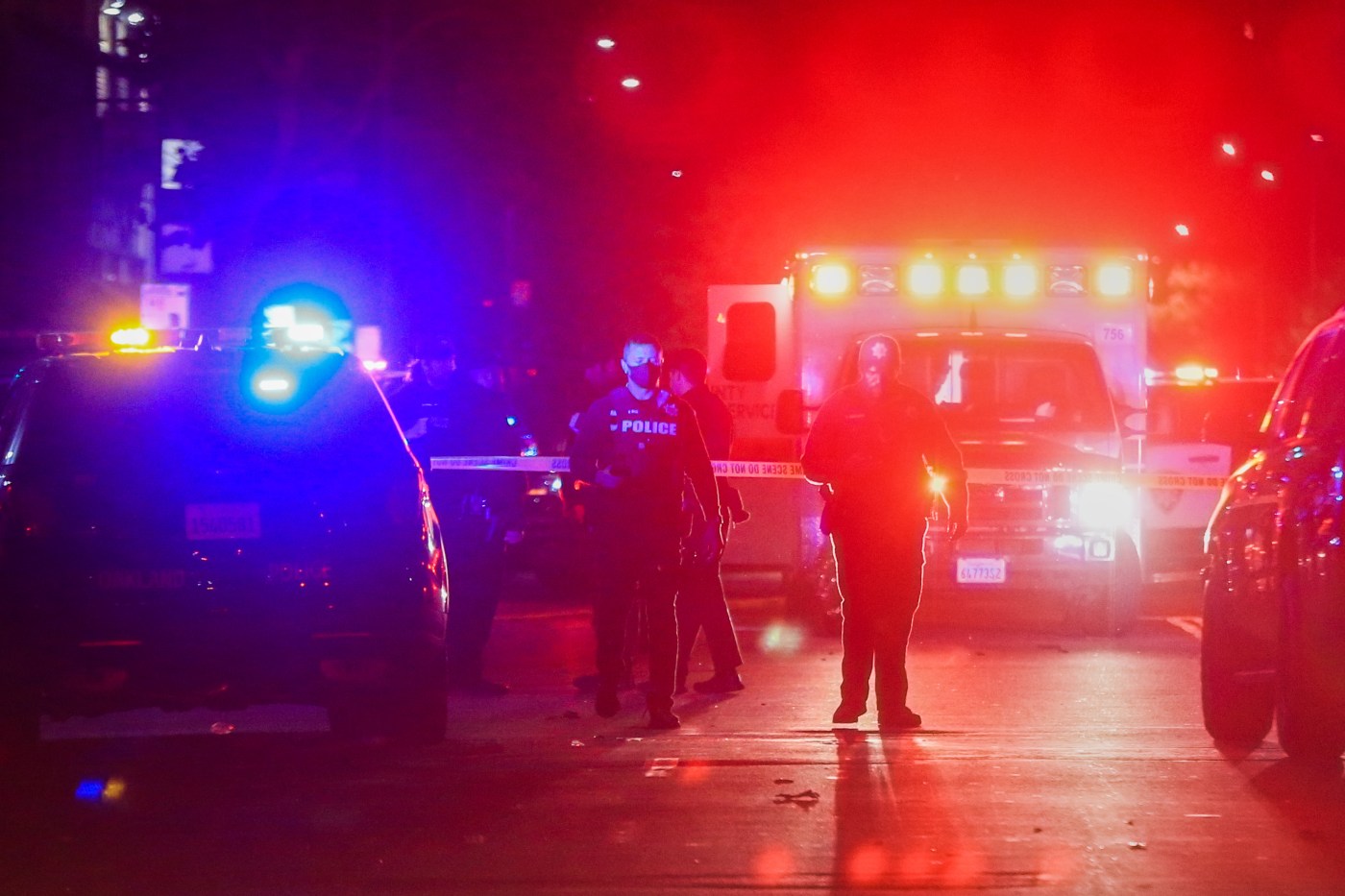
OAKLAND — Two brothers have been charged with beating and stomping a fellow nightclub patron while onlookers filmed, and one of them got into the music industry after his release from prison for a murder conviction.
James Lamont Baldwin, 47, and his brother, Kenneth Baldwin Jr., 48, were charged with attempted murder and robbery in connection with the June 15, 2025 beatdown.
Related Articles
Two killed, four injured in East Oakland shootout
One shot, two stabbed in violent Oakland confrontation over graffiti
Man killed in Oakland Uptown shootings Saturday was innocent victim purchasing food
Dying from stab wounds, East Bay custodian told his murderer, ‘You’re going to pay’
Man shot in East Oakland
The victim told police that someone hit him inside the Cave Lounge on 14th Street in downtown Oakland, at which point a bouncer grabbed him by the thumb and threw him outside. The Baldwin brothers then allegedly proceeded to hit and kick him several more times on the block as he lay defenseless on the ground, authorities said.
Both brothers have pleaded not guilty and remain held at Santa Rita Jail in Dublin, with no bail set, records show. Kenneth Baldwin is due in court on Sept. 16 for a bail hearing, and James Baldwin is scheduled to appear before a judge on Sept. 19.
James Baldwin, who frequently goes by the nicknames “Lamont” or “Mont,” has a storied history in Oakland, according to court documents. He was released from prison 10 years ago after a court overturned his murder conviction, and his Instagram page — with more than 10,000 followers — lists him as the manger for a popular local rapper.
James Baldwin was sentenced to 50 years to life in prison, for murdering 24-year-old Terrill Zachery near 91st Avenue and A Street in 2002. It was a case propped up by eyewitnesses, one of whom flat out refused to testify, and another who was shot and killed months before Baldwin’s trial.
Baldwin’s first-degree murder conviction was initially upheld by a state appeals court, which rejected his arguments that an Alameda County prosecutor had committed misconduct and that “the few instances in which arguable misconduct may have occurred did not result in prejudice.”
But a federal judge in 2015 reached the opposite conclusion. A blistering opinion by U.S. District Judge Claudia Wilken found numerous instances where the prosecutor, then-Deputy District Attorney Matthew Golde, committed misconduct in court, which was compounded by Baldwin’s lawyer’s failure to object. The defense lawyer, Theodore Berry, did nothing when Golde told jurors during his closing argument that “with this kind of evidence, if you find this defendant not guilty, I mean, it’s almost like it’s open season in East Oakland” and that it would be “essentially lawlessness out there.”
Wilken found that, “Because the prosecutor’s statements appealing to the passions of the jury were likely to have a substation prejudicial effect, defense counsel’s failure to object constituted deficient performance.”
Wilken later added that Golde had repeatedly misstated the law or witness testimony, including painting two defense witnesses as being afraid of agreeing with the prosecution’s theory when they both specifically said they weren’t.
The Alameda County District Attorney’s Office appealed Wilken’s decision, but before the Ninth Circuit court could decide, prosecutors and the defense reached a plea agreement. Baldwin was sentenced to 13 years he had already served and released from prison in 2015.
A probation report, signed by Deputy Probation Officer Myiesha Denny and approved by supervisor David Haitema, argued Baldwin was “well deserving” of a life sentence and added, “this is an injustice to the victim and his family whereby the defendant will be freed based on the misconduct of others and/or technicalities that jeopardized him receiving a fair trial.”
One eyewitness told retired police Oakland Capt. Brian Medeiros — who secretly recorded the interview while a sergeant — that he was driving with Baldwin through Oakland on July 1, 2002 in a green Cadillac. At 91st Avenue near A Street, Baldwin noticed Zachery and allegedly said, “there’s that (expletive) that killed Little T,” referring to the killing of a man named Terryn Walton in Oakland a year earlier. Baldwin then allegedly put on a wig, got out of the Cadillac and shot Zachery nine times, including twice in the back of the head.
The witness, Erik Gaines, refused to testify at Baldwin’s preliminary hearing, then insisted he was just saying what he wanted police to hear so they’d let him out of a drug case. Another purported eyewitness, Randy Hicks, was killed months before trial, but Judge Wilken noted that he had made statements favorable to the defense theory and balked at the idea Hicks would have been killed for his silence.
Once out of prison, Baldwin became “deeply involved in his community,” said his current lawyer, Jeff Wozniak.
“(Baldwin) has worked for years to reduce violence in the city of Oakland. As more facts come out about the incident for which he is charged, it will become clear that he is innocent,” Wozniak said.
Four years ago, Baldwin’s name came up tangentially while police were investigating the shooting death of 41-year-old Edward Morgan. Authorities say they reviewed surveillance footage and saw the suspect speaking with Baldwin near Baldwin’s car, outside a store on the 8400 block of International Boulevard. Police checked Baldwin’s phone records, hoping the suspect had called him before the killing, but the gunmen was never arrested or charged, court records show.
When Baldwin was arrested in this June’s attempted murder case, police found him near the same store on International Boulevard, according to the jail booking log.